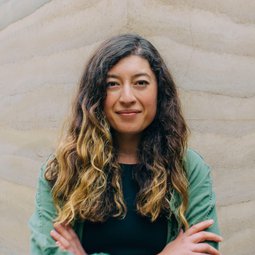Emily Cardarelli

Address:
4800 Oak Grove Drive
Pasadena, CA 91109Curriculum Vitae:
Click hereMember of:
Planetary GeosciencesBiography
Emily is a Postdoctoral Fellow in the Astrobiogeochemistry Laboratory at JPL. Her research is driven by understanding how microbes and the earth interact across spatial scales, within landscapes, and through time. Using laboratory- and field-based studies, she integrates genomic and geochemical techniques to illuminate subsurface organo-mineral interfaces and biogeochemical processes within alluvial environments.
At JPL, Emily is a member of the SHERLOC Instrument Team on Mars 2020 investigating the biosignature preservation potential of magnesium carbonates in Mars-analog environments and rock-regolith geochemical transitions in Jezero crater.
Education
- Ph.D. in Geomicrobiology, Earth System Science Department at Stanford University (2021)
- M.S. in Geomicrobiology, Earth System Science Department at Stanford University (2015)
- B.S. in Earth and Environmental Science (magna cum laude w/ dept. honors), Tulane University (2012)
Professional Experience
- Postdoctoral Research Fellow in Astrobiogeochemistry (PIs: Luther Beegle and Kenneth Williford), NASA-JPL, Pasadena, CA. (2020-present)
- Graduate Research Assistant in Geomicrobiology and Floodplain Hydro-Biogeochemistry (PI: Christopher Francis), Earth System Science Department at Stanford University, Stanford, CA. (2012-2020)
- Course Creator/Instructor for Diversity and Inclusion in the Geosciences (EARTH 203), School of Stanford Earth at Stanford University, Stanford, CA (2019)
- Teaching Assistant for Microbiology (ESS 253), Hopkins Marine Station of Stanford University, Pacific Grove, CA (2018)
- Teaching Assistant for Measurements in Earth Systems (EESS 212), Earth System Science Department at Stanford University, Stanford, CA. (2013)
- Research Assistant for the Office of Manpower and Reserve Affairs, Department of the U.S. Army, Pentagon, Washington, D.C. (2009-2011)
- Undergraduate Research Assistant in the Stable Isotope Laboratory (PI: Brad Rosenheim), Tulane University, New Orleans, LA. (2010-2012)
Community Service
2019 EARTH 203: Diversity and Inclusion in the Geosciences, Stanford University, Instructor and Course Developer
2019-2020 Stanford Polo Club, Stanford University
2017-2020 Chair, ESS Student-Invited Seminar Committee, Stanford University
2014-2015 Vice-President, Graduate Student Advisory Council, Stanford University
2012-2016 Volunteer soil instructor, GeoKids (1,000 children per year), Stanford University
Research Interests
organo-mineral interfaces, subsurface microbial ecology, biosignature formation/preservation, genomics, stable isotope geochemistry, rock-regolith-water interfaces
Selected Awards
- Stanford Earth Service Award for DEI, awarded in recognition for outstanding individual efforts and a long-term contribution to advancing Diversity, Equity, and Inclusion at Stanford Earth, Stanford University (2021)
- Community Impact Award, awarded for dedication and meaningful impact on the Stanford community, Stanford Alumni Association, Stanford University (2020)
- Rising Environmental Leaders Fellow, Woods Institute for the Environment, Stanford University (2019)
- Outstanding Achievement in Mentoring, Stanford School of Earth, Energy, and Environment, Stanford University (2016)
- Tulane 34 Award, given for leadership, service, and academic contributions to the Tulane community, Tulane University (2012)
- Chairman’s Award, awarded for high academic standing and research contributions in Earth and Environmental Science at Tulane University (2012)
- The Under the Oaks Award, awarded for advancing women’s education at Tulane University (2012)
- Certificate of Achievement Award, Department of the U.S. Army (2010)
Selected Publications
- 2020 Cardarelli, E.L., Bargar, J.R., & Francis, C.A. Diverse Thaumarchaeota dominate subsurface ammonia-oxidizing communities in semi-arid floodplains in the Western United States. Microbial Ecology. DOI:10.1007/s00248-020-01534-5.
- 2017 Noël, V., Boye, K., Kukkadapu, R. K., Bone, S., Lezama-Pacheco, J., Cardarelli, E., Janot, N., Fendorf., S., & Bargar, J. R. Understanding controls on redox processes in floodplain sediments of the Upper Colorado River Basin. Science of The Total Environment. 603: 663-675. DOI: 10.1016/j.scitotenv.2017.01.109
- 2017 Noël, V., Boye, K., Lezama-Pacheco, J., Bone, S., Janot, N., Cardarelli, E., Williams, K., & Bargar, J. Redox controls over the stability of U(IV) in floodplains of the Upper Colorado River Basin. Environmental Science and Technology. 51: 10954-10964. DOI: 10.1021/acs.est.7b02203
- 2017 Peay, K., von Sperber, C., Cardarelli, E., Toju, H., Francis, C., Chadwick, O., & Vitousek, P. Convergence and contrast in the community structure of Bacteria, Fungi and Archaea along a tropical elevation-climate gradient. FEMS Microbiology Ecology. 93. DOI: 10.1093/femsec/fix045